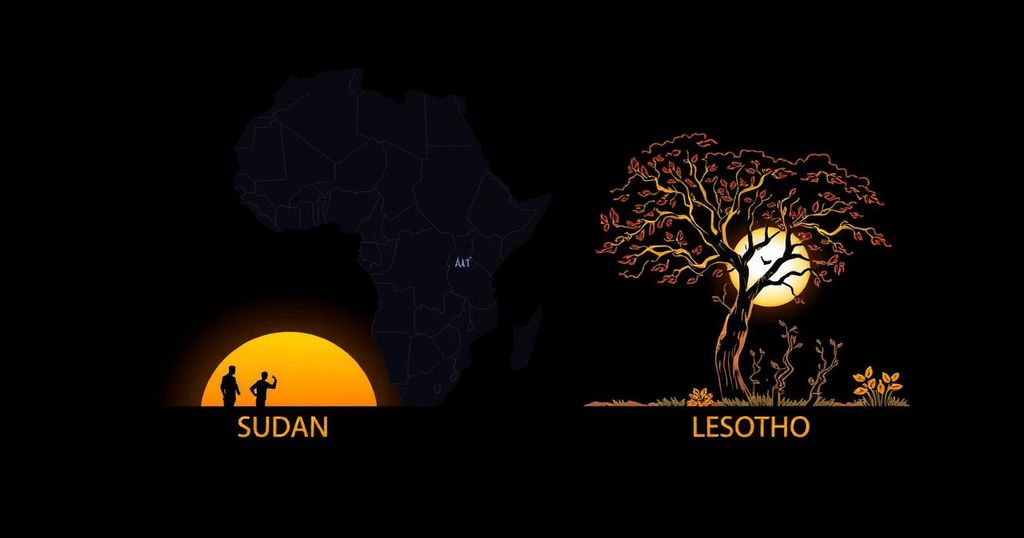Sudan and Chad are experiencing worsening flooding, impacting hundreds of thousands, while Lesotho is struggling with a severe drought, affecting approximately 700,000 people. The UN is coordinating humanitarian responses in these regions as they confront food insecurity and health risks associated with these environmental challenges.
Recent reports indicate that both Sudan and Chad are experiencing significant flooding, while Lesotho is grappling with a severe drought, according to the United Nations. The UN Office for the Coordination of Humanitarian Affairs (OCHA) highlighted that heavy rainfall has affected approximately 500,000 individuals across various regions of Sudan, particularly in South Darfur, the Red Sea, the River Nile, and Northern states since late June. Stephane Dujarric, chief spokesperson for UN Secretary-General Antonio Guterres, addressed the situation in a daily briefing. In Sudan, particularly in areas already facing famine risks like El Fasher, the humanitarian crisis has exacerbated due to flooding, as around 124,000 residents have been impacted by the heavy rains. Furthermore, the stagnant water has increased the likelihood of disease outbreaks, with nearly 2,900 suspected cholera cases reported since mid-August. In response, the United Nations and affiliated organizations have mobilized their efforts to provide assistance. Recently, they supplied life-saving therapeutic food to approximately 6,000 children suffering from severe acute malnutrition in Nyala, South Darfur. Conversely, in Chad, OCHA reported a worsening situation due to flooding, which has led to at least 340 fatalities and has affected nearly 1.5 million residents. The destruction of over 160,000 homes further complicates the crisis. Agriculture has also been severely impacted, resulting in acute hunger for approximately 3.4 million people during this lean season. In light of this, the Acting UN Emergency Relief Coordinator, Joyce Msuya, has increased emergency funding from the Central Emergency Response Fund (CERF) to support flood response efforts in Chad. Meanwhile, Lesotho is confronting a deteriorating food security situation attributed to a historic drought exacerbated by El Niño. The government reports that around 700,000 individuals are currently facing hunger, prompting the declaration of a national disaster concerning food security in July. Agricultural output has diminished significantly, decreasing by one third. In response to this crisis, $2 million has been allocated from the CERF to assist with drought recovery efforts, and a UN team, led by Assistant Secretary-General and Climate Crisis Coordinator Reena Ghelani, recently visited Lesotho to evaluate the situation and advocate for increased international aid.
The ongoing crises in Sudan, Chad, and Lesotho reflect the broader impact of extreme weather phenomena influenced by climate change, exacerbated by events such as the El Niño climate pattern. These environmental challenges significantly affect agricultural productivity, food security, and overall humanitarian conditions in vulnerable regions of Africa. The United Nations plays a critical role in coordinating emergency assistance and providing vital resources to mitigate the effects of such disasters on local populations. The urgency for international support highlights the interconnectedness of climate resilience and sustainable development initiatives across the continent.
In summary, Sudan and Chad are urgently addressing the pressing effects of severe flooding, while Lesotho faces a grave situation related to drought. The humanitarian crises across these nations underscore the need for continued international support and efficient coordination from organizations like the United Nations to alleviate suffering and bolster recovery efforts in the face of climate-induced disasters.
Original Source: news.cgtn.com






